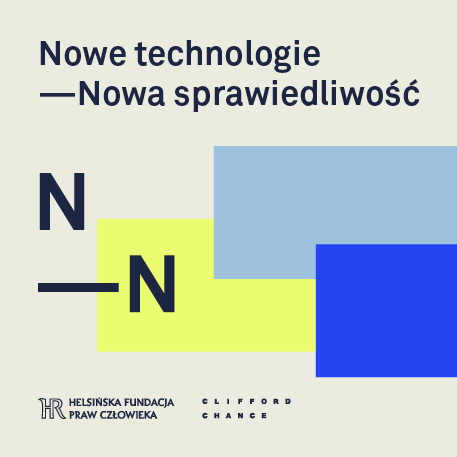
New Technologies — New Justice – a joint project of the Helsinki Foundation for Human Rights and Clifford Chance
In today’s world, new technologies are present in virtually all spheres of life – and they are also becoming increasingly important for the modern justice system. The project seeks to examine the actual presence of new technologies in the justice system of Poland and around the world, as well as to identify the main risks associated with modern legal technologies and the most promising solutions to these risks. The advancing digitalisation of the justice system and the digital modernisation of the legal system is an inevitable consequence of the need to ensure that the legal system keeps up with the times.
That is why the Helsinki Foundation for Human Rights and Clifford Chance work to identify solutions for improving the justice system to ensure that the rights and freedoms of individuals are not only respected but also exercised more easily.
New Technologies — New Justice is a joint project of the Helsinki Foundation for Human Rights and Clifford Chance.
A comparative analysis of presence of new technologies in the justice systems around the world
Helsinki Foundation for Human Rights has done research on the actual presence of new technologies in the justice system of Poland and around the world. Below you can find a comparative analysis regarding presence of new technologies in justice system of USA, Italy, Spain, Estonia, Japan, Czechia, Wales and England.
New Technologies – New Justice – New Questions: the latest report by the Helsinki Foundation and Clifford Chance
The report, developed by the Helsinki Foundation for Human Rights as part of a project carried out with Clifford Chance focuses on the functioning of new technologies in the justice system.
Are international courts trailbrazers in the field of computerisation of the judiciary?
Are international courts trailbrazers in the field of computerisation of the judiciary and should we follow their lead.
The debate participants included:
- Jolanta Ojczyk, journalist, prawo.pl;
- Sylwia Gregorczyk-Abram, Clifford Chance;
- prof. Ireneusz Kamiński, The Institute of Law Studies of the Polish Academy of Sciences.
AI and learning algorithms – an opportunity to streamline court proceedings or a modern day golem?
It’s the third of a series of discussions about digitisation of courts.
The debate participants included:
- Jakub Górnicki, journalist, Outriders;
- Kate Scott, Clifford Chance London;
- Konrad Siemaszko, Helsinki Foundation for Human Rights.
Digital exclusion – an obstacle to the process of digitilization of the judiciary?
Digital exclusion – an obstacle to the process of digitilization of the judiciary? It’s the second of a series of discussions about digitisation of courts.
The debate participants included:
- Karolina Głowacka, journalist, Radio TOK FM;
- Marcin Szwed PhD, Helsinki Foundation for Human Rights;
- Sylwia Błach, programmer of the Supercomputing and Networking Center Polish Academy of Sciences.
Can digitisation of courts be the remedy for the lengthy proceedings?
We present you the first of a series of discussions about digitisation of courts. The debate participants included:
- Ewa Ivanova, journalist, Gazeta Wyborcza
- Marcin Ciemiński PhD, Clifford Chance Warsaw
- Piotr Kładoczny PhD, Helsinki Foundation for Human Rights.
Why it’s time to digitize courts?
Why it’s time to digitize courts? Is this justice accessible to eveerybody? How digitization of the justice system affects those digitally excluded?
We will publish a series of talks called ‘New Technologies – New Justice – New Questions’ and try to find answers to these questions and maybe solutions which are not obvious.
“New” trials in “old” courts, or how the pandemic changes court sittings
The COVID-19 pandemic has amplified the long-standing calls for more extensive digitisation of the justice system. “E-trials” provide an example of the use of new technologies in the courts. They can not only become a solution to such problems as access to courts or lengthy court proceedings but can also help the judiciary to deal with emergencies, say, a pandemic that prevents direct interpersonal contacts.


15.03.2021
 Cookies EN
Cookies EN